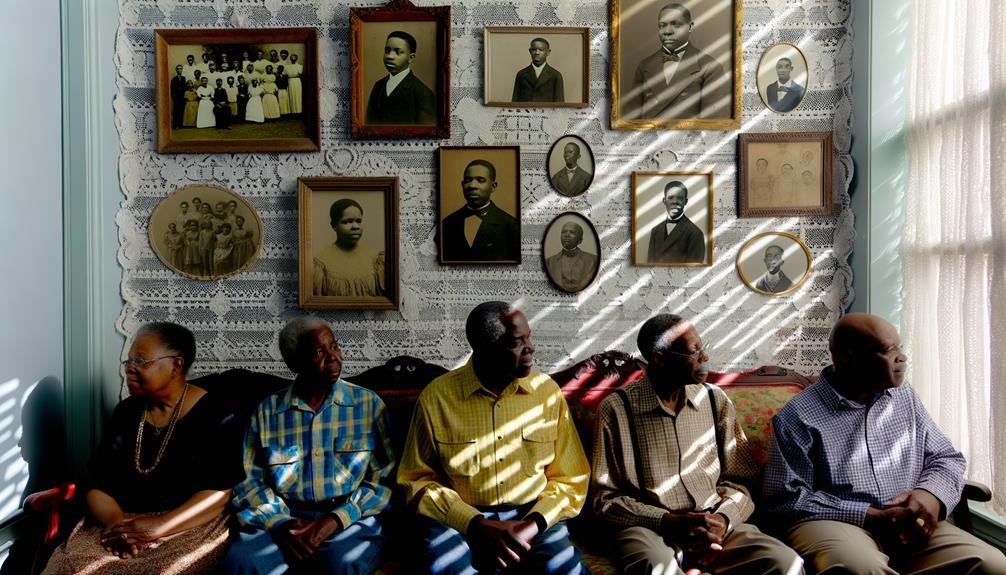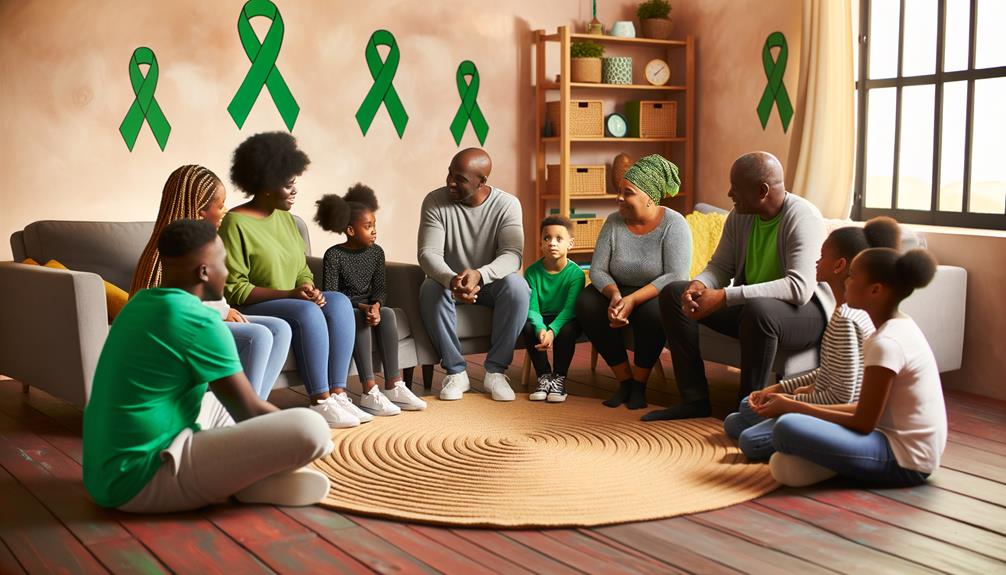You might've noticed how mental health often feels like an unspoken topic in the Black community, shrouded in layers of cultural stigma and historical mistrust. It's not just about acknowledging these issues but understanding why they've persisted and how you can play a role in changing the narrative. Imagine a community where mental well-being is openly discussed, breaking free from the chains of silence. What steps can you take to foster this change, and how can personal stories and community efforts transform perceptions? The journey toward open dialogue starts with asking these questions.
Historical Context of Mental Health

Understanding the historical context of mental health in the Black community is crucial to appreciating its current challenges and triumphs. You're diving into a past where mental illness was often misunderstood and mishandled, particularly for Black individuals.
Historical treatment of mental health issues was marred by racism and inequality, which left deep scars. During slavery, any signs of mental illness were ignored or attributed to laziness or rebellion, rather than being recognized as genuine health issues.
Post-emancipation, access to mental health care remained limited and biased, further perpetuating neglect and stigmatization.
As you look through history, you'll notice how systemic oppression shaped the perception and treatment of mental illness within the Black community. Black patients were often misdiagnosed or subjected to substandard care.
This history of neglect and mistreatment has contributed to a lingering mistrust of the mental health system. Yet, despite these hurdles, resilience shines through.
You can see how community support networks have historically stepped in to fill the gaps. By understanding this context, you're better equipped to support the ongoing journey toward equitable mental health care and to celebrate the community's strength and progress.
Cultural Stigmas and Misconceptions
Acknowledging the weight of cultural stigmas and misconceptions, you'll find that they play a significant role in shaping the mental health landscape within the Black community.
It's common to encounter cultural perceptions that equate strength with the ability to endure mental illness without seeking help. This belief often leaves individuals feeling isolated, ashamed, or afraid to admit when they're struggling.
In many Black households, mental health issues might be dismissed as personal weaknesses rather than legitimate conditions that require attention and care. These misconceptions can prevent open conversations, leading to a lack of understanding and support.
Moreover, the notion that discussing mental health is taboo perpetuates a cycle where seeking help is seen as unnecessary or even weak.
To break these barriers, it's crucial to address and challenge these cultural perceptions. By fostering environments where mental illness is openly discussed and understood, you can encourage more compassionate conversations.
This shift not only validates personal experiences but also empowers those in the community to seek the help they deserve. Embracing education and empathy can redefine mental health narratives, paving the way for healing and acceptance within the Black community.
Impact of Systemic Racism

The shadow of systemic racism looms large over the mental health of the Black community, influencing both access to care and the quality of treatment received. You might find that systemic barriers and access disparities make seeking help daunting.
Racial trauma, rooted in historical oppression, compounds this struggle, affecting your mental well-being. Economic inequality often dictates the resources available, limiting your options for support. These social determinants create a landscape where mental health care isn't always equitable or accessible.
Despite these challenges, your cultural resilience shines through. It's important to recognize that navigating identity struggles in a world shaped by systemic racism is no small feat.
You're part of a community that has continuously demonstrated strength, even when faced with seemingly insurmountable odds. By understanding the impact of these systemic issues, you're better equipped to advocate for change and seek the support you deserve.
The Role of Faith and Spirituality
Many within the Black community find solace and strength in faith and spirituality, which play a pivotal role in mental health. Faith practices, including prayer groups and healing rituals, offer a foundation of spiritual resilience that can support mental wellness. When you're facing life's challenges, turning to these practices can provide comfort and a sense of belonging.
Churches often serve as safe havens, where church support becomes a lifeline for those struggling silently. Faith leaders, through their guidance and wisdom, can help you navigate mental health challenges while fostering a supportive environment.
Community outreach initiatives led by churches can be instrumental in spreading awareness and providing resources for mental wellness. These programs not only educate but also encourage you to seek help when needed.
It's important to remember that embracing spirituality doesn't mean ignoring professional mental health support; rather, it's about finding a balance that works for you. By integrating spirituality into your life, you can cultivate a deeper sense of peace and purpose.
Breaking the silence around mental health in the Black community can start with recognizing and embracing the positive role that faith and spirituality can play in your life.
Personal Stories and Experiences

Imagine you're sitting across from someone who shares their journey of grappling with mental health challenges while celebrating their triumphs. They recount personal narratives that are both heart-wrenching and inspiring, revealing the resilience cultivated through adversity.
You listen as they describe moments of despair and isolation, yet what shines through is their unwavering courage to seek help. They've learned that vulnerability isn't a weakness but rather a powerful tool for healing.
As they share, you notice the various coping strategies they've adopted. From therapy sessions to journal writing, each strategy serves as a stepping stone towards recovery.
They speak of meditation, connecting with nature, and even finding solace in creative outlets like painting or music. These strategies, they explain, have become anchors in their journey, providing stability amid life's storms.
Their story is a reminder that breaking the silence around mental health in the Black community requires bravery and persistence.
Community Initiatives and Support
Hope thrives in communities that rally together to support mental health in the Black community. When you're part of a network that values healing and understanding, it can transform lives.
Community workshops play a pivotal role in this movement, offering safe spaces where individuals can learn about mental health, challenge stigma, and develop coping strategies. These workshops often feature experts and facilitators who understand cultural nuances, ensuring the content resonates and is relevant. You gain tools not just for yourself but to uplift others around you, building a stronger, more informed community.
Peer support is another cornerstone of effective community initiatives. It's about connecting with others who've walked a similar path, sharing experiences, and offering encouragement.
You're not alone in your journey, and peer support groups can be a vital source of strength and inspiration. They foster an environment where vulnerability is met with empathy and understanding, creating bonds that can lead to lasting change.
Steps Toward Open Dialogue

One crucial step toward open dialogue about mental health in the Black community is fostering environments where candid conversations are encouraged and normalized. You can promote mental health awareness by initiating open conversations with family and friends, creating a safe space for honesty and vulnerability.
Encouraging youth engagement is vital, as young people often lead the way in changing societal norms. You can involve them in wellness workshops that teach coping strategies and emphasize the importance of mental well-being.
Family dynamics play a significant role in shaping attitudes toward mental health. By addressing these dynamics, you can help dismantle stigmas and build support networks within the family.
Sharing educational resources, such as books, articles, and online content, can provide valuable insights and broaden understanding.
Connect with local organizations to host community events focused on mental health awareness. These events can include panels, expert talks, and interactive sessions, all designed to facilitate open conversations and equip individuals with practical tools.
Conclusion
You've got the power to change the narrative around mental health in the Black community. By acknowledging historical and cultural challenges, you can foster understanding and compassion. Lean on faith and spirituality, but don't be afraid to share personal stories and seek help. You're not alone; community initiatives offer support and encouragement. Start conversations, challenge stigmas, and take active steps toward open dialogue. Together, you can break the silence and build a healthier future.


